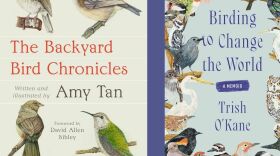Barbara J. King
is a contributor to the NPR blog 13.7: Cosmos & Culture. She is a Chancellor Professor of Anthropology at the College of William and Mary. With a long-standing research interest in primate behavior and human evolution, King has studied baboon foraging in Kenya and gorilla and bonobo communication at captive facilities in the United States.
Recently, she has taken up writing about animal emotion and cognition more broadly, including in bison, farm animals, elephants and domestic pets, as well as primates.
King's most recent book is How Animals Grieve (University of Chicago Press, 2013). Her article "When Animals Mourn" in the July 2013 Scientific American has been chosen for inclusion in the 2014 anthology The Best American Science and Nature Writing. King reviews non-fiction for the Times Literary Supplement(London) and is at work on a new book about the choices we make in eating other animals. She was awarded a Guggenheim Fellowship for her work in 2002.
-
In his sequel to 'This Day,' Berry’s themes, including bringing alive the joys and sorrows of hard-working rural Kentuckians. are revisited in ways both familiar and fresh.
-
Nature's healing power is an immensely personal focus for Foster. He made his film after being burned out from long, grinding hours at work. After the release of the film, he suffered from insomnia.
-
Novelist Amy Tan's The Backyard Bird Chronicles centers on an array of birds that visit her yard, as Trish O'Kane's Birding to Change the World recalls lessons from birds that galvanized her teaching.
-
Here the New York Times columnist and author of Late Migrations and Graceland Margaret Renkl brings alive in 52 chapters her love for the animals and plants in her yard and nearby parks in Tennessee.
-
Activist Greta Thunberg was just 15 when she called on the world to take action on the climate crisis. Just as impressively, she has now pulled together essays by 100 scholars on what's needed now.
-
David Allen Sibley's name is synonymous with his bird field guides. In researching this volume, he became convinced of something new: Birds make complex decisions and experience emotions.
-
Combining the knowledge of a seasoned scientist and the skills of a good storyteller, the ecologist-author invites us to leave our cultural worlds and enter some animal ones to see just how they work.
-
Understanding the lives of animals can illuminate our own — and those of loved adolescents too. But authors Barbara Natterson-Horowitz and Kathryn Bowers at times push cross-species links too far.
-
Charles King tells the story of Franz Boas' powerful challenge to racial science — and of how others like Margaret Mead and Zora Neale Hurston contributed to that project.
-
New York Times columnist Margaret Renkl astonishes with her essays, a woven tapestry that makes one of all the world's beings that strive to live — and, in one way or another, face mortality.







